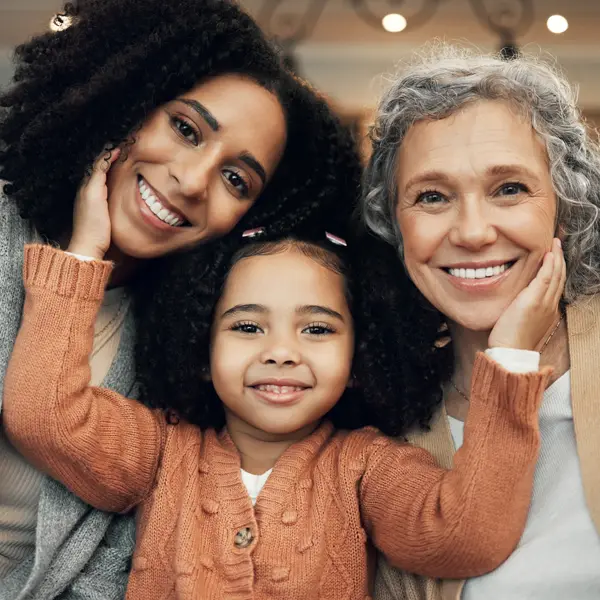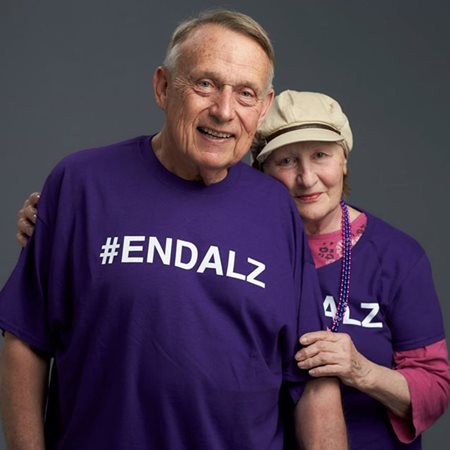
Make 2x the Impact Now
Make 2x the Impact Now
Our March Mission Match is underway, but not for long. Your gift by March 10 can go twice as far to advance research and help provide care and support for those living with Alzheimer’s and their caregivers.
Give NowMarty Schreiber, former governor of Wisconsin, married Elaine, his high school sweetheart, in 1961. Elaine died in 2022 after a 20-year battle with Alzheimer's. Marty chronicled the couple’s journey in his book "My Two Elaines: Learning, Coping, and Surviving as an Alzheimer's Caregiver."
Elaine’s first symptoms of Alzheimer’s began to appear in the mid-2000s, when the couple were both in their 60s. When doctors confirmed that Elaine had Alzheimer's, the couple cried and prayed together. As the disease progressed, Elaine wrote letters and journal entries, including love notes to Marty. “When you love someone for nearly 70 years, you draw strength from your experiences,” Marty says.
“I’d be so lost without you — so please continue to take good care of yourself for me as well as for you. - Elaine to Marty, 2013
Marty, how did you and Elaine first meet?
We met in high school Latin class when we were both 14. The class was arranged in alphabetical order. Her maiden name was Thaney, so we sat near each other. I knew I wanted to marry her then.
She later assisted me in my campaign for freshman class president, which was the first time I ran for office. She always helped me in my endeavors with the greatest support. If not for her, there would be no me.
What was it like when roles reversed and Elaine began her journey with Alzheimer’s?
I didn’t know what I was losing at the time. I went through a period where I tried to keep Elaine in my world. I had not yet accepted that there was no more ‘first’ Elaine. I was doing everything I could to try and hold onto her.
When I began to understand that I had to help and protect her, there was no time for “woe is me.” I had to step up and be her advocate, as she always was for me. When I took my wedding vows, that meant that I would l do everything I could to help us both live our best lives possible.
I learned that I had to do the best for my ‘second’ Elaine, my Elaine with Alzheimer’s. When providing 24/7 care was something I could no longer handle on my own, it was time for her to live someplace where the level of support met her needs. Moving her into a care home was difficult, but it was the best way to ensure she received the care she needed.
You talk about ‘first’ Elaine and ‘second’ Elaine, who she was after she developed Alzheimer’s. Tell us about your two Elaines.
My first Elaine was always positive, gracious, truthful and straightforward, traits I always appreciated and admired. She would never let me feel a political loss or any defeat. She was my cheerleader and biggest champion.
To celebrate our 59th wedding anniversary, we had dinner at her assisted living care home. Afterwards, in her room, I sat next to her and held her hand. When I started to cry, she asked why. I said, “All I want is for you to know that I love you very much.” She replied: “Well, then everything is okay.” She knew I needed to be at peace, and she gave me that with her words of love and assurance. That was my Elaine.
 My second Elaine cried, too, when one day, she said she began to love me more than her husband. What that meant to me is that your loved one with Alzheimer’s does not need to know your name for your hearts to touch. I began to understand that even as my ‘second Elaine,’ the wonderful woman was still there, and she would always accept me for who I was, with love and kindness.
My second Elaine cried, too, when one day, she said she began to love me more than her husband. What that meant to me is that your loved one with Alzheimer’s does not need to know your name for your hearts to touch. I began to understand that even as my ‘second Elaine,’ the wonderful woman was still there, and she would always accept me for who I was, with love and kindness.
What do you want to share with other Alzheimer’s and dementia caregivers?
Focus on how to help your loved one and live your best lives possible. You do that by eliminating stress; you take control of what you can, and take care of yourself as the caregiver. Support I received through the Alzheimer's Association helped me realize that I could not do this alone.
Letting go of my first Elaine to embrace the new, second Elaine happened gradually as I began to realize what I was losing. But you lose even more if you don’t learn to pivot. I wrote my book to help other caregivers going through these painful journeys and transitions in their lives.
What would you hope Elaine would think today of your raising awareness for this cause?
She would be so happy that we made a difference in other people's lives. That is what Elaine did. Through her work in early childhood education and as a grandparent, she always made everything better. She stayed grounded and centered, and she used her voice to advocate on behalf of all those living with the disease.
I think Elaine would say: 'You were a governor, a state senator, an executive, and you helped many people. But you helped even more people because of my disease.’ My goal is to help caregivers learn, cope, and survive. Anything I can do to that end, I will continue to do.
It’s long been said that men don't stop and ask for directions. As a male caregiver, I speak openly about this disease. I am thankful that men and women who have read my book or heard me speak about my story have had the courage to approach me to tell their stories.
Asking for help is the wise and courageous thing to do for you and your loved one. Asking for help does not make you weak, nor is it a sign of giving up. It is just the opposite. It is a sign of courage, a sign that you are NOT giving up.
One of the important ingredients in life is to know that you may sometimes fail, but you are never defeated. I have failed during different occasions in my life, including my campaigns, but Elaine never allowed me to feel defeated. She always gave me the energy and the courage to move forward.
What do you wish you had known before your experiences with Alzheimer’s?
If Alzheimer's is bad, ignorance of the disease is worse. Not understanding the signs and symptoms, or keeping the person in your world when their world has changed is a misstep.
Join their world. The details are not important. If someone puts the keys in the freezer, don’t scold them like a child. Only the bigger picture matters—supporting and loving your person.
If Elaine would ask me how her parents were doing, and I said they had died, she would be devastated. If I told her that they were doing well, she would be okay. I am an advocate of this approach when necessary, because it helps both the caregiver and the person with the disease.
How did you both show your love on Valentine’s Day, and every day?
After many Valentine's Days together, you realize it's the single worst night to try and get a table for dinner! One thing Elaine would always do is make me cashew cookies, sometimes with chocolate. Those were my favorite.
The holiday was not met with extravagance. Taking a moment to realize that we were so lucky to have each other was most important, plus showing our appreciation for each other. We were married for over 60 years and together for almost 70. I couldn’t ask for more.
We never fought about big things, and we were partners who knew that the little things ultimately don’t matter: only love does. It truly is better to have loved and lost than to never have loved at all.
"When in heaven, I will always be smiling down at you, with great love, to the best man in the world." - Elaine to Marty in 2015
About: Elaine Schreiber died at age 82 at the Elaine's Hope Memory Care Assisted Living Center, named in her honor. Elaine's brain was donated to the University of Wisconsin-Madison Brain Donor program to be used in Alzheimer's research.
In 1962, Marty Schreiber was elected as the youngest-ever member of the Wisconsin State Senate. Elected lieutenant governor in 1970, he became the thirty-ninth governor of Wisconsin in 1977. He and Elaine have four children, Kathryn, Marty, Kristine and Matt, 13 grandchildren and seven great-grandchildren. Proceeds from the sale of Marty's book “My Two Elaines” are used to support Alzheimer’s caregiving programs.

The first survivor of Alzheimer's is out there, but we won't get there without you.
Donate Now
Learn how Alzheimer’s disease affects the brain.
Take the Brain Tour
